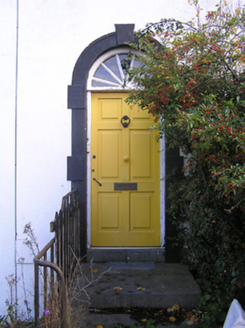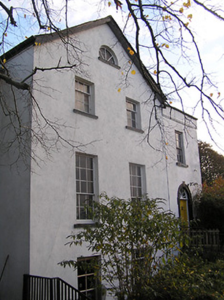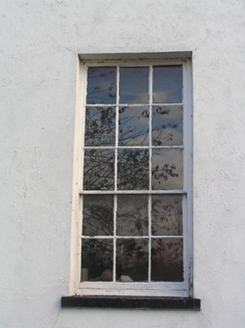Survey Data
Reg No
12401416
Rating
Regional
Categories of Special Interest
Architectural, Historical, Social
Original Use
Rectory/glebe/vicarage/curate's house
In Use As
House
Date
1795 - 1805
Coordinates
245719, 162589
Date Recorded
01/01/2005
Date Updated
--/--/--
Description
Detached two-bay two-storey over raised basement gable-fronted Board of First Fruits glebe house with dormer attic, built 1800, with single-bay two-storey lower entrance end bay to right, and single-bay two-storey recessed lower end bay to left. In use, 1946-7. Now in private residential use. Pitched (gable-fronted) slate roof (hipped roofs to end bays (behind parapet to entrance end bay)) with clay ridge tiles, rendered chimney stacks, slightly sproketed eaves, timber bargeboards to gables, and cast-iron rainwater goods on rendered eaves. Painted rendered walls with rendered parapet to entrance end bay. Square-headed window openings (lunette window opening to gable blocked-up with painted render over) with cut-limestone sills, nine-over-six (ground floor) and three-over-six (first floor) timber sash windows having six-over-six timber sash window to first floor entrance end bay. Round-headed door opening with cut-limestone step over open basement having wrought iron railings, painted cut-stone Gibbsian surround having keystone, and timber panelled door having fanlight. Interior with timber panelled shutters to window openings. Set back from road in own grounds with concealed piers having iron gates.
Appraisal
Retaining the original composition attributes recalling, according to Maurice Craig and William Garner, the concept of Lucan House (c.1775), County Dublin, together with most of the historic fabric both to the exterior and to the interior a well-appointed middle-size house incorporating Classically-derived detailing represents an important element of the architectural heritage of the locality particularly on account of the status as a reminder of the once-prosperous Church of Ireland community in the area having originally been intended as an ecclesiastical residence sponsored by the Board of First Fruits (fl. 1711-1833). The house remains of additional importance for the historic connections with the Helsham and the Watson families.





